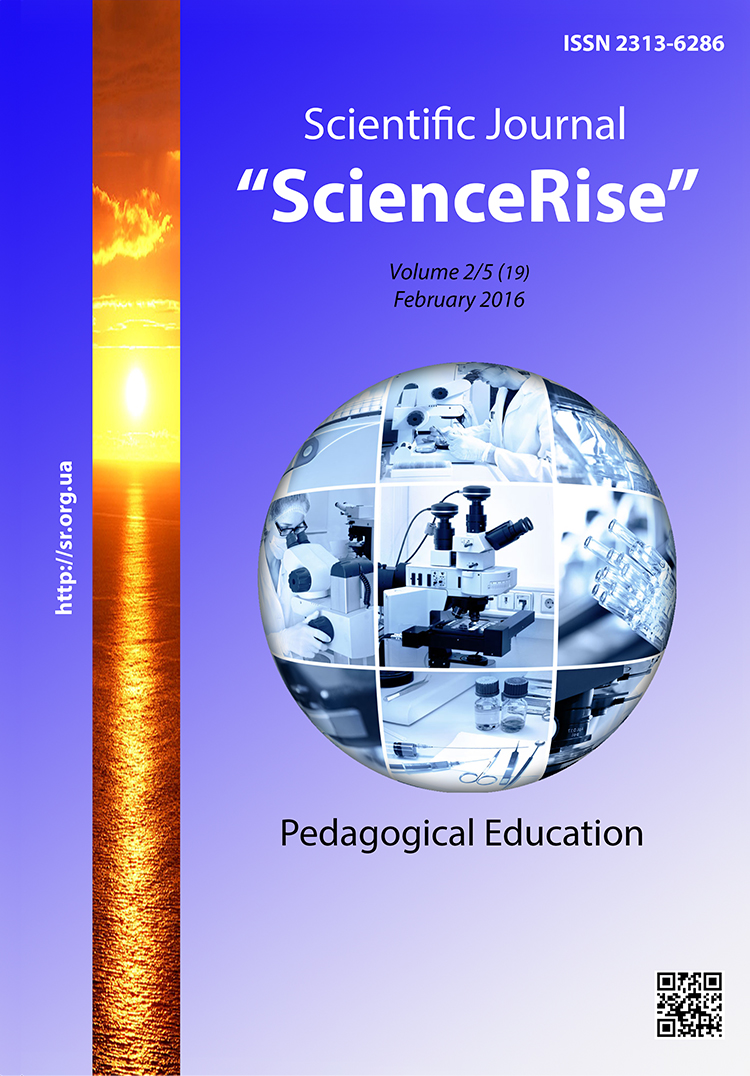Requirements for teachers’ profesional competencies in the context of polycultural education
DOI:
https://doi.org/10.15587/2313-8416.2016.60889Keywords:
polyculturalism, multicultural, ethnically heterogeneous, polyethnic, competency, European identity, selectivity, integration, educational paradigm, globalizationAbstract
The article deals with problems of polycultural education of teachers. The main problem of the society today is that it is becoming multicultural, and different cultural patterns, views, beliefs and attitudes make it difficult to communicate. Ukraine is standing on the threshold of these cultural changes due to economic and educational mobility. So Ukrainian pedagogical science needs to get ready to the challenges of a multicultural world. The article states that new socio-economic environment needs new approaches to teaching and new competencies of teachers. They are: language of instruction skills, mother tongue of their students skills, intercultural communication skills, working in a diverse educational environment skills etc. The main problem that all teachers face is their reluctance to admit that multiculturalism is a part of today’s reality and they need to to be ready not only tolerate it but accept it and see the benefits of it. They have to learn use these advantages due to polycultural approach that is to be implemented into the system of education. In the article we describe some methods of teachers’ possible work with their students with the aim of implementing polyculturalism into school daily life and teaching activities provided by M. Sinclair. Polycultural approach views culture as an evolving and constantly changing phenomenon (F. Dervin). Polycultural education is the education of all the students not only minorities. According to this educational principle a new education paradigm should be constructed that would unite administrators, teachers, students, parents, community. The problem with administrative stuff is that there are much more representatives of minority groups among students then among the teaching stuff and administrators. On the other hand a teacher or an administrator should not be appointed only thanks to his/her ethnical or cultural background. A special attention should be given to the position of minority female teachers. Issues of teachers/community; teachers/parents co-operation in multiethnic educational environment are still to be studied
References
Banks, J. (1995). A Handbook of Research on Multicultural Education. New York: MacMillan Publishing.
Nieto, S. (2010). Affirming diversity: the sociopolitical context of multicultural education. New York: Pearson Publishing.
Dervin, F. (2014). Towards post-intercultural teacher education: analysing “extreme” intercultural dialogue to reconstruct interculturality. European Journal of Teacher Education, 38 (1), 71–86. doi: 10.1080/02619768.2014.902441
Aydin, K. (2013). British Multiculturalism: Diversity Issues and Development of Multicultural Education in Britain. Chap. 3. Academia, 58–91. Available at: https://www.academia.edu/5445586/British_Multiculturalism_Diversity_Issues_and_Development_of_Multicultural_Education_in_Britain
Luchtenberg, S. (2005). Multicultural Education: Challenges and Responses. JSSE, 1, 31–55. doi: 10.4119/UNIBI/jsse-v4-i1-978
Trepptke, C. Multicultural Approaches in Education: A German Experience Multiculturalism in Early Childhood Programs. Turkish Children and Mothers Project (ECAP Collaborative). Available at: http://ecap.crc.illinois.edu/eecearchive/books/multicul/trepptke.html
Aydin, H., Tonbuloğlu, B. (2014). Graduate students perceptions on multicultural education: a qualitative case study. Journal of Educational Research, 14 (57). doi: 10.14689/ejer.2014.57.3
Pukhovs'ka, L. P. (2000). Osobystisna model' pidhotovky vykladachiv na zakhodi [Personality model of teachers’ training in the West]. Naukovi praci. Mykolaiv: Vyd-vo MF NaUKMA, 7, 20–22.
Miliutina, O. K. (2008). Polikul'turna osvita shkoliariv u Velykobrytanii [Polycultural education of schoolchildren in Great Britain]. Zhytomyr, 260.
Frolova, O. V. (2013). Etnichni stereotypy iak chynnyk strukturuvannia komunikatyvnoho polia osobystosti [Ehtnical stereotypes as a factor of structuralizing the communicative personality scope]. Kyiv, 208.
Arakelian, V. O. (2001). Polykul'turnoe obrazovanye: suschnost' y soderzhanye [Polycultural education: essence and contents]. Moscow, 148.
Education and Training 2020 (2010). ETUCE Circular 1/2010. Brussel, 11. Available at: http://www.csee-etuce.org/images/attachments/ETUCECircular2010EN.pdf
Perotti, A. (1994). The case for intercultural education. Council of Europe press, 158.
Sinclair, M. (2004). Learning to live together: Building skills, Values and Attitudes for the twenty-first century. UNESCO: International Bureau of Education, Geneva, 167. Available at: http://s3.amazonaws.com/inee-assets/resources/doc_1_48_Learning_to_Live_Together.pdf
Sierens, S. (Ed.) (2000). Us, Them, Ours. Points for attention in designing interculturallly sound learning materials. Centre for intercultural education. Ghent, Belgium.
Ozbarlas, Y. (2008). Perspective on Multicultural Education: Case Studies of a German and an American Female Minority Teacher. Dissertation, Georgia State University. Available at: http://scholarworks.gsu.edu/msit_diss/34
Downloads
Published
Issue
Section
License
Copyright (c) 2016 Інна Володимирівна Ковалинська

This work is licensed under a Creative Commons Attribution 4.0 International License.
Our journal abides by the Creative Commons CC BY copyright rights and permissions for open access journals.
Authors, who are published in this journal, agree to the following conditions:
1. The authors reserve the right to authorship of the work and pass the first publication right of this work to the journal under the terms of a Creative Commons CC BY, which allows others to freely distribute the published research with the obligatory reference to the authors of the original work and the first publication of the work in this journal.
2. The authors have the right to conclude separate supplement agreements that relate to non-exclusive work distribution in the form in which it has been published by the journal (for example, to upload the work to the online storage of the journal or publish it as part of a monograph), provided that the reference to the first publication of the work in this journal is included.

